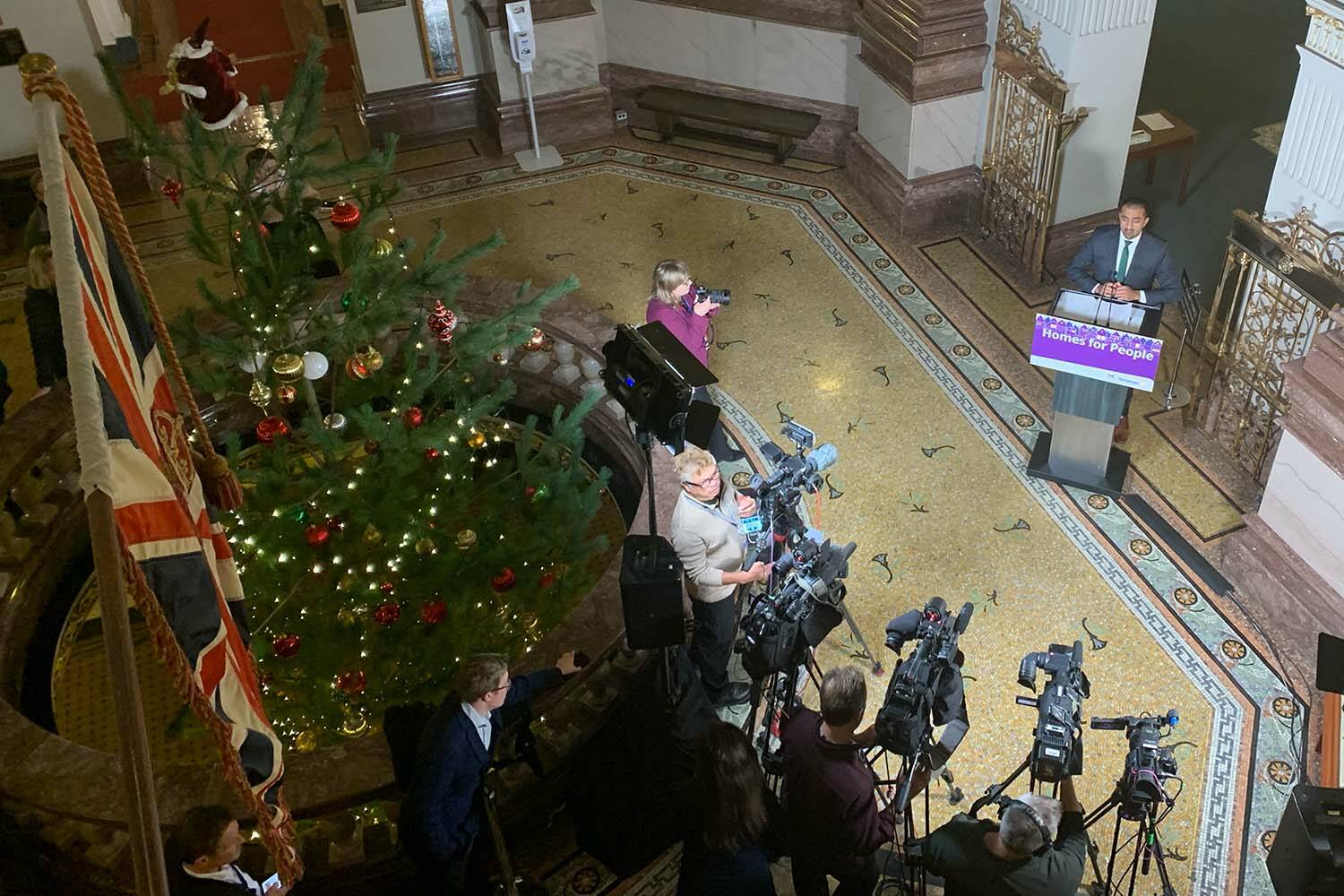The provincial government wrapped up a legislative session dominated by housing with the promise of more housing legislation in the spring of 2024.
But that did not stop the opposition from questioning the effectiveness of the laws passed and the way the government passed them.
Housing Minister Ravi Kahlon, who also serves as Government House Leader, said more housing legislation is on the way during a news conference Thursday (Nov. 30) as the fall session wrapped up.
“We are currently developing legislative tools to support local governments and developing…zoning policies to create more affordable homes and will soon be launching BC Builds,” he said. That program promises to create more housing for middle-income households on public lands.
This promise comes after the passage of multiple pieces of housing legislation. Depending on perspective, they will either boost housing supplies and lower costs, do nothing, or ramp up speculation in the private housing market while robbing municipalities of their zoning and democratic control powers.
But all voices generally agree that the total package adds up to changes not seen in generations.
Perhaps none of the laws is more significant than Bill 44. Starting July 1, 2024, developers will be able to start building a minimum of three and up to six units (near transit) on lots currently zoned for single-family homes and duplexes in municipalities above 5,000 people home to 90 per cent of the provincial population.
Government predicts Bill 44 will create 130,000 homes in B.C. in 10 years. But critics of government have questioned these figures and called on government to release the modelling behind them, something Kahlon said would happen in the near future.
RELATED: B.C. government cuts debate short, passes major new housing bill
RELATED: New housing legislation promises to create 130,000 homes in B.C. in 10 years
RELATED: Changes promise to cut B.C. development negotiations, provide certainty
RELATED: B.C. aims to increase housing density around rapid transit, bus exchanges
RELATED: B.C.’s new short-term rental regulations approved after colourful debate
Government was also poised to pass Bill 46 promising to speed up the construction of new housing in B.C. by eliminating lengthy and costly re-zoning negotiations between developers and municipalities. The legislation also reforms the charges municipalities can collect to fund infrastructure.
Bill 47 promises to create up to 100,000 new net housing units during the next decade in areas near transit hubs — be they bus exchanges or rapid transit stations. Notably, it passed unanimously Thursday.
Bill 35, meanwhile, reforms short-term rentals in B.C.
The fall session also saw the provincial government extend the speculation and vacancy tax to 13 municipalities, mainly on Vancouver Island and the Okanagan, while hinting at future expansions to communities currently not covered.
“It was an incredibly productive fall session, but I would like to say again that big changes are coming to address the challenges we are facing, especially on housing,” Kahlon said. “We are unlocking and creating the conditions that encourage faster housing for communities throughout B.C. (It) will require every level of partnership to make this happen.”
BC United Leader Kevin Falcon agreed with Kahlon’s assessment that the fall session saw the introduction of important legislation, but questioned its effectiveness.
“(I) think we can also agree that it became pretty apparent that much of this legislation was brought through in a manner that showed it was not fully thought through and they hadn’t considered unintended consequences,” he said.
Other voices appear to share Falcon’s perspective, including former NDP premier Mike Harcourt, whom Falcon gleefully quoted in the session’s last Question Period. Harcourt and Darlene Marzari, a former minister under Harcourt, said in a Vancouver Sun op-ed piece that federal and provincial measures show insufficient regard for the autonomy of local governments and their infrastructure needs , while warning of future field days for land speculators.
When asked about the op-ed piece, Kahlon said Harcourt actually advocated for the removal of single-family zoning across Metro Vancouver in 2018.
“So it’s hard to know his positions, because they have changed a couple of times,” he said. “But in the end, I think we can both agree that we are in a housing crisis and we need to take action and that’s reflected in the work we have been doing this session.”
The fall session is also wrapping up with concerns about the democratic quality of the legislative process. Specific criticisms focused on Kahlon’s role in managing that process with government accused of rushing through legislation, thereby denying opposition parties the chance to properly review legislation.
BC Green Party Leader Sonia Furstenau accused the NDP of becoming the very thing the party despised when it was in opposition. Good governance, she said, depends on good processes that are transparent and accountable.
Kahlon said the fall session saw 61 hours of discussion and debate around housing legislation. “(So) there was significant exchange, significant ideas to share and unfortunately, given the dynamics of the place, we just were not able to continue to have that debate anymore.”
When asked about the criticisms directly aimed at him, Kahlon said he is confident that the parties “will find a way to get together and ensure that this places continues to function, because in the end it’s about people.”
Kahlon had earlier faced criticisms from BC United House Leader Todd Stone and BC Green House Adam Olsen for misleading the legislature about limiting debate on Bill 44.
Democracy is teetering on the brink, Olsen warned last week, in warning of a dangerous blurring between the executive proposing law and the legislature scrutinizing said laws. Olsen also later questioned the effectiveness of the housing legislation.
Kahlon shrugged off that criticism. “It’s not about ego,” he said. “I don’t take any offence to what people say to me. What’s most important to me is, ‘how do we get more housing for people?’”
@wolfgangdepner
wolfgang.depner@blackpress.ca
Like us on Facebook and follow us on Twitter.

